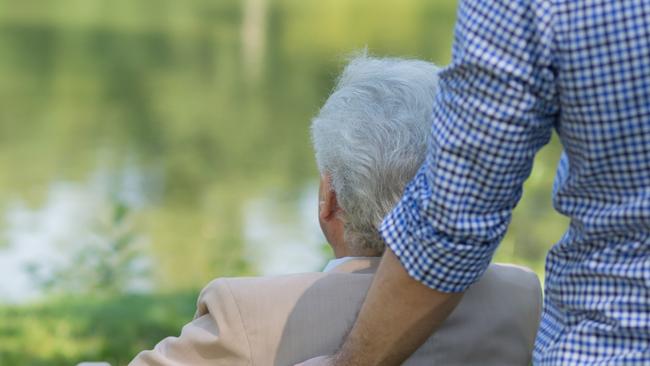Qld Voluntary Assisted Dying inquest: Huge change recommended after grieving man dies after ingesting wife’s VAD dosage
The death of a man who consumed his wife’s Voluntary Assisted Dying dosage has sparked a coroner to recommend a major change to the scheme to prevent “further calamity and heartbreak”.

QLD News
Don't miss out on the headlines from QLD News. Followed categories will be added to My News.
A coroner examining a grieving widower’s death by ingesting a lethal substance provided to his wife as part of Queensland’s Voluntary Assisted Dying scheme has recommended a massive change otherwise “further calamity and heartbreak await for patients and families”.
The death of the man, given the pseudonym ABC at the inquest, came just 107 days after the VAD scheme came into operation.
The man’s wife entered the VAD scheme suffering end stage cancer and planned on self-administering the life ending substance that is made available to participants in the program. The other option is to have a medical practitioner administer the substance.
The man was nominated as the contact person - a role which required him to return any unused VAD substance within 14 days of his wife dying or revoking her decision to self administer the substance.
The inquest, held in February in Brisbane, heard a specialist VAD team from Brisbane drove to the regional area where the couple lived and handed over the lethal substance at a hospital.
ABC took the VAD substance to their home - where his wife was intending on taking it - and locked it away.
His wife revoked her decision to self administer the VAD substance after being readmitted to hospital.
She died a short time later in hospital causing ABC to struggle with grief and recently contracted Covid symptoms, the inquest heard.

Eight days later ABC consumed what had been his wife’s lethal VAD substance - which he had not returned - at home and died.
In his findings delivered on Wednesday Coroner David O’Connell recommended the VAD substance “remain under the direct control of an authorised health professional” at all times.
Mr O’Connell said the health professional, which could be a palliative care doctor or nurse or general practitioner, could attend upon the VAD patient with the substance on the date the patient has chosen to take it.
“(They ) could provide it to the Contact Person or VAD patient, oversee its’ correct set out, and then step back while it is consumed,” he said.
“To me a revised approach achieves the compassion required for the VAD patient and their family, while always ensuring the most dangerous of pharmaceutical products is kept under the direct control at all times of an authorised health professional, and the substance cannot be misused”.
Mr O’Connell said ABC’s death was “not simply some one-off anomaly or solitary aberration”
“No one objectively analysing the program can rightly say it has been working perfectly except for ABC’s death. There has already been an unintended death and several very near misses,” he said.
“The current system is imperfect. Further calamity and heartbreak await for patients and families if nothing changes.”
Mr O’Connell said the “very centre of the flaw in the current system” was the handing over of the self-administer VAD substance to the contact person who undergoes no background checks and in the case of ABC had been diagnosed with depression.
“This highly dangerous drug can then, in practical terms, simply be left on the kitchen table of a patient’s residence because where it is kept, how securely it is stored, where the keys to the lockbox are kept (if indeed the box remains locked), is entirely left with the patient or their Contact Person,” he said.
“The current self-administration process is open to improper use, and … there is potential for sinister misuse.”
Mr O’Connell said currently there was not “an appropriate balance struck between patient autonomy and lethal medication safety” and ABCs death was avoidable “if appropriate considerations for lethal medication safety had been implemented.”
He did not find any breach of law by VAD personnel.
“I do hope that the government is wise enough to read and consider these reasons, and then act appropriately and implement the required changes to the VAD oral substance administration system,” he said.
Health Minister Shannon Fentiman said the government would consider the recommendations.
“Queensland Health has already done some work in that respect, given there was an investigation following that case,” she said.
“We are (also) working on a review of that legislation coming up to three years. That will start next year.”
Originally published as Qld Voluntary Assisted Dying inquest: Huge change recommended after grieving man dies after ingesting wife’s VAD dosage


